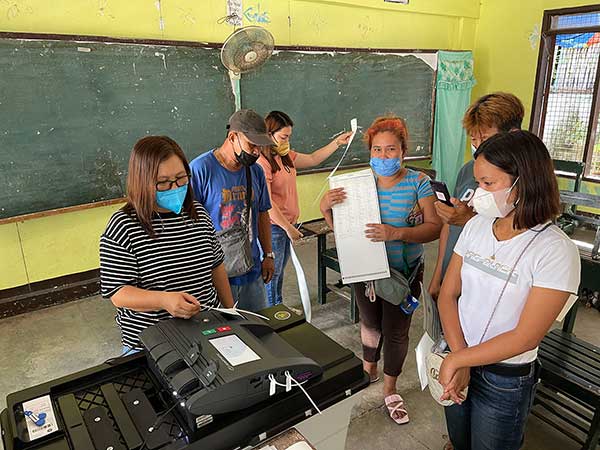
By Joseph Bernard A. Marzan
The 2025 national and local elections (NLE) will come with significant changes not seen since the country shifted to a more digital polling system in 2010, according to a former official of the Commission on Elections (COMELEC).
Former COMELEC spokesperson and Daily Guardian columnist James Jimenez discussed these changes with Daily Guardian on Air via Aksyon Radyo-Iloilo last Friday, May 24.
These include new automated counting machines (ACM), direct transmission of vote counts to the media, and piloting internet-based voting for several overseas absentee polling stations.
Jimenez highlighted the common thread in these new features planned for next year’s elections—the improvement of transparency efforts from the country’s polling body.
The ACMs were recently procured from South Korea-based Miru Systems through a joint venture with three Filipino entities, including Integrated Computer Systems, St. Timothy Construction Corporation, and Centerpoint Solutions Technologies Inc., under a P17.9-billion contract.
This is part of the larger lease of a Full Automation System with Transparency Audit/Count (FASTrAC), which also includes an election management system, consolidation and canvassing, ballot printing, and ballot boxes.
They will be taking over from Smartmatic, which had been the provider from the 2010 to the 2022 elections.
Jimenez explained that the new features will enhance the transparency of the election process, including Quick Response (QR) code receipts with a summary of votes and public access to ballot images.
He cited a recent pronouncement by COMELEC chairperson George Erwin Garcia that the public may be able to see inside the ballot box at the precinct level, previously available only when there was a protest filed.
“Compared to the previous elections under Smartmatic, after inserting the ballot into the counting machine, you were done as a voter. You would not see how the votes were summed up. Now, you will be given a receipt with a QR code. The QR code can be used for a recount,” Jimenez said.
“The COMELEC is studying the possibility of showing the ballot images right away so that, if you are monitoring the elections, you will see the contents of every ballot. Of course, you will not see who voted, because there is still ballot secrecy, but what is important is that you see what the ballot images are like without having to wait for the long process of a protest,” he added.
The voter, however, cannot keep the receipt with the QR code as it will still be kept with the ballots.
Jimenez further said that public access to ballot images would minimize the unfounded fears of past automated elections.
“From 2010 to 2022, there haven’t been any false results shown, nor were there any mistakes proven in the machine counting. It’s just that, if the people have fear or apprehension, you have to address that. You cannot ignore it, and you have to really address that,” he stated.
Media organizations accredited by COMELEC will also have direct access to real-time counting, resulting from the elimination of the transparency server.
The system used in the 2016 and 2022 elections had the results transmitted to the transparency server before being sent to the media for use in their reports.
This change, he said, would address doubts in the 2022 elections, where there were discrepancies in the official canvass and the transparency server due to time delays between the two.
“That makes everything more transparent and, hopefully, faster because it will be direct from the precinct itself. […] Before, usually what is appearing is the official canvass, but the COMELEC releases the machine’s counting to the transparency server. If they don’t match, then the public would have doubts,” he said.
Jimenez also discussed the online voting system for overseas absentee voting, which was announced by current COMELEC spokesperson Rex Laudiangco on April 2, clarifying that this was a pilot test and an optional mode of voting.
There are 17 confirmed posts where this will be implemented, including at Philippine embassies in Papua New Guinea, Timor-Leste, Myanmar, Russia, Nigeria, Jordan, Lebanon, Syria, Iran, and Libya, and in embassies and consulates-general in China and Turkey.
“[It is] important to note, this is just a pilot test status. There will be limited use of internet-based voting overseas so that the COMELEC can study its pros and cons for a wider implementation. It is very important that internet voting is just an option. There are still other means, but it will be introduced as an option for places where you can have internet voting,” he said.
The former COMELEC spokesperson also backed Garcia’s pronouncements during the Third National Conference on Investigative Journalism last April 30 on premature campaigning and candidate substitution rules.
Garcia said those who file their certificates of candidacy this October would be considered official candidates from that time for the purposes of campaigning, and that voluntary substitution would be prohibited.
The commission has previously prohibited premature campaigning, but the 2009 Supreme Court case of Penera vs. COMELEC provided that campaign rules only apply when the campaign season starts.
“The COMELEC is taking the initiative to solve a problem that we have been seeing for a long time,” he said.





















